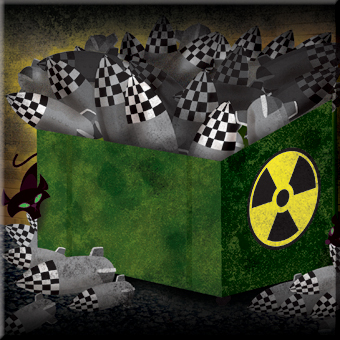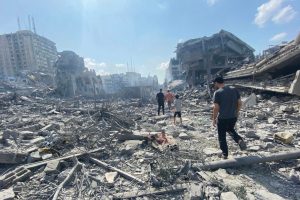The U.S. bishops issued their 1983 pastoral letter The Challenge of Peace without a total condemnation of nuclear arms but planned to revisit the issue after the Cold War. More than 25 years later, the question is still on the table.
Sounding Boards are one person’s take on a many-sided subject and do not necessarily reflect the opinions of U.S. Catholic, its editors, or the Claretians.
A native Texan, I was ordained a priest of the Diocese of Amarillo in 1946. For all but three of the following years my assignments as a priest were within 17 miles of the Pantex facility, located northeast of Amarillo.
Pantex, I learned in time, was the final assembly and disassembly plant for all nuclear warheads produced in the United States. The plant lies within the territory of St. Francis of Assisi Parish, where I was pastor from 1971 until 1980.
Generally supportive of President Dwight Eisenhower’s “Atoms for Peace” concept, I was unconcerned about what was going on at Pantex. When parishioners approached me with qualms about the morality of working there, I tried to reassure them and referred them to the bishop of Amarillo.
On May 30, 1980, I became the bishop.
That summer Sister Regina Foppe, a Victory Noll Missionary Sister, challenged me to condemn the assembly of nuclear weapons in our own backyard as a theft from the poor. A resolution by the diocesan presbyteral council seconded her challenge.
Still, I hesitated. That Christmas I preached a bland sermon on peace and good will and urged an end to the Cold War between our country and the Soviet Union.
Then the year 1981 arrived with more wake-up calls, the first a subtle one as I was praying Psalm 33 in the liturgy of the hours: “A vain hope for safety is the horse; despite its power it cannot save.” Something, someone-the Spirit of God?-tricked me. I found myself praying, “A vain hope for safety is the nuclear bomb; despite its power it cannot save.”
I shook that off, but then a barrage of other voices followed. On February 15 Pope John Paul II visited the Peace Park in Hiroshima, Japan, the first city to experience the utter devastation of an atomic bomb.
“I bow my head,” the pope said, “as I recall the memory of the thousands of men, women, and children who lost their lives in that one terrible moment, or who for long years carried in their bodies and minds those terrible seeds of death which inexorably pursued their process of destruction. . . . To remember Hiroshima is to abhor nuclear war. To remember Hiroshima is to commit oneself to peace.”
That same February a story on the front page of Amarillo’s newspaper reported how Oblate Father Larry Rosebaugh and five others had scaled the outer security fence around Pantex, been arrested, and were being held in the Potter County Detention Center to await trial. Stunned, I went to see him and found a saintly man.
After that, a permanent deacon and his wife came to see me, asking if it was morally acceptable for him to be working at Pantex.
In June Archbishop Raymond Hunthausen of Seattle denounced the Trident submarine base near Seattle as “the Auschwitz of Puget Sound.” The nuclear warheads atop the submarines’ intercontinental ballistic missiles were assembled at Pantex and delivered by train in heavily guarded, white, heat-reflecting railroad cars. If Hunthausen judged the possession of nuclear weapons immoral, what was my judgment to be about their assembly at Pantex?
Finally, in August the White House approved the assembly at Pantex of the enhanced radiation warhead, the so-called neutron bomb. The bomb was specifically designed for “enhanced” destruction of all biological life-including men, women, children, and infants in the womb-while leaving material infrastructure intact.
It was just one more step in the implementation of the immoral policy of “Mutual Assured Destruction,” which the two superpowers had adopted to deter each other from launching a nuclear attack. The Cold War arms race between the United States and the Soviet Union resulted in each country possessing 25,000 nuclear warheads, more than enough to destroy the earth many times over. The policy, dubbed MAD, remains in force today.
Convinced at last that we had lost our moral moorings, I issued a statement urging workers engaged in the production, assembly, and deployment of nuclear weapons to consider the implications of what they were doing, to resign from such activities, and to seek employment in peaceful pursuits.
The call ignited controversy, condemnation, and praise, and it brought state, national, and international media to the Texas Panhandle. At their next meeting, the bishops of Texas unanimously expressed their support and issued a statement of their own condemning nuclear weapons.
This action of the Texas bishops was later credited by some with moving the National Conference of Catholic Bishops in its November 1981 general assembly to appoint a committee of five bishops, headed by the late Cardinal Joseph A. Bernardin, to undertake a nationwide consultation on the issue.
A year and a half later, in May 1983, the U.S. Catholic bishops met in Chicago to finalize the pastoral letter The Challenge of Peace: God’s Promise and Our Response.
The debate was heated. Because nuclear bombs are so indiscriminately destructive and leave a legacy of radiation so sickening, the majority was convinced that we had no choice but to condemn them lock, stock, and barrel.
On the second day the majority voted in a provisional ballot for a total moral condemnation of nuclear weapons. In the final vote on the third day, however, to get in line with the more nuanced position of the Vatican, we voted–many of us reluctantly–for a strictly conditioned moral acceptance of nuclear weapons as a temporary deterrent to aggression.
We emphasized that such a policy could not be “a long-time basis for peace” and stipulated that the acceptance was to change to condemnation once the Cold War ended. We agreed to review the situation every five years.
But even though the Cold War ended in 1989, the issue has never been put back on the agenda of the bishops’ general assembly.
Why have we not kept the promise we made? Why have we not issued an unconditional moral condemnation of the production, assembly, and deployment of nuclear weapons? Why have we not formally declared ourselves to be a church of peace, a full-fledged pro-life church?
“What can be said . . . about those governments which count on nuclear arms as a means of ensuring the security of their countries?” Pope Benedict XVI asked in his 2006 World Day of Peace message. His answer: “This point of view is not only baneful but also completely fallacious. In a nuclear war there would be no victors, only victims.”
More than a quarter century after the peace pastoral, it is time for us bishops-and all U.S. Catholics-to act on this conviction, to speak out more forcefully, and take on a moral leadership role in the current efforts to completely eliminate nuclear weapons.
Despite disagreements on other issues, the pope has gone out of his way to praise President Barack Obama for actively pursuing nuclear disarmament, a significant departure from previous U.S. policy. Last September Obama convened and chaired a meeting of the United Nations Security Council that unanimously approved a resolution on nuclear disarmament that commits the international community “to work for a world without nuclear weapons.”
Sixty-five years after Hiroshima and Nagasaki, the specter of giant mushroom clouds rising in the skies above our crowded cities that leaves children, women, and men evaporated, cremated, and lifeless, haunts us as nuclear weapons continue to proliferate.
The hour of decision is here for the Catholic Church in the United States, led by our bishops, to join the growing secular and religious chorus of voices demanding the abolition of nuclear weapons.
If not now, when?
And the survey say…
1. It is fundamentally immoral for a country to possess nuclear and other weapons of mass destruction.
60% – Agree
33% – Disagree
7% – Other
2. Today the U.S. Catholic bishops should lead the church by embracing and actively working toward the complete abolition of nuclear weapons.
66% – Agree
28% – Disagree
6% – Other
3. I think the use of nuclear arms again in my lifetime is:
17% – Likely.
65% – Possible.
18% – Not Likely.
4. I think that total nuclear disarmament in my lifetime is:
3% – Likely.
56% – Possible.
41% – Not likely.
5. Symbolic protest actions of Catholic peace activists against nuclear weapons that involve trespassing or damage of military property are:
40% – Prophetic and courageous.
35% – Wrong and embarrassing.
15% – Silly and pointless.
10% – Other.
6. I support complete nuclear disarmament by the United States:
41% – As the end result of careful negotiations with other nuclear powers.
23% – Now.
17% – Never, because the nuclear weapons genie is out of the bottle.
15% – Not in the near future, because of terrorists and rogue nations.
4% – Other.
7. With the end of the Cold War, possession of nuclear weapons by the United States is:
31% – A morally indefensible gamble with millions of lives and the survival of the planet.
26% – A difficult moral dilemma that I am unsure how to judge.
20% – A necessary evil.
20% – Morally justified and necessary because of terrorists and nations such as Iran and North Korea.
3% – Other.
The best way the Catholic Church in the United States can address issues of war and peace is by . . .
Living nonviolently and speaking out, but with R.O.T.C. all over Catholic universities, the dollar speaks louder than truth.
Working for more social equality. Rogue nations and terrorists are born out of fundamentally unsound governments and ones where people feel they have no options or ways to improve their circumstances.
Remaining consistent in our proclamation that war is never the correct answer. There is always another way. Peace may be harder to achieve and take longer without the use of force, but I firmly believe we can achieve it.
Helping us see where war exists in our personal relationships and how to live in peace with one another.
Strongly condemning the adoration of military culture that seems so prevalent in our country today.
Getting back to the basics of prayer and fasting, and benediction and other means in which large groups can invoke our Lord.
Having a peace, justice, and nuclear disarmament committee in every parish.
Keeping peaceful attitudes in the forefront of liturgies and other activities.
Walk the talk and implement what was stated in The Challenge of Peace with conviction and immediacy.
Treating this as a pro-life issue that’s just as important as abortion.
Bishops taking a firm, prophetic stand, pastors giving challenging homilies, and students being taught peacemaking skills and conflict resolution.
Standing up and going against the grain.
The United States should prevent nuclear proliferation among terrorists and rogue nations by . . .
Exploring diplomatic options in cooperation with developed nations.
Constant vigilance and investigations. Trust doesn’t work.
Setting a good example by disarming, not getting involved in other countries’ domestic strifes, and limiting their access to nuclear weapons.
Taking problem-solving steps without being afraid of political fallout. You win from strength and action, not complacency and acceptance.
Maintaining a constantly updated superior nuclear force that will prevent attacks out of fear for their own destruction.
Limit arms sales to conventional weapons, develop military technology-such as precision bombing-to control the development of nuclear capabilities by rogue nations.
Urging worldwide support among peaceful nations and sanctions against those threatening nations.
Promoting the peaceful use of nuclear energy to meet the needs of poorer nations.
Catholics whose work involves the production, assembly, or deployment of nuclear weapons should . . .
Consult with their pastors.
Keep up the good work.
Consider changing careers once the economy picks up.
Continue to work but pray that such weapons will not be used.
Keep their jobs if they want them. It’s their choice.
Be challenged by their choice of involvement. Catholics should be more reflective about our life choices-including their career.
Not be concerned. This country has generally followed Christian morality and until it stops, God will bless it.
Find other, morally acceptable employment that uses their talents and education for the benefit of society rather than its destruction.
Carefully and prayerfully consider the consequences of their work.
General Comments
As a weekly protester for peace in my town, I feel a total lack of support from my parish.
Although I love and support my son, who is in the military, I do not think military action is the answer. It will take negotiations to stop and prevent more nuclear proliferation.
Do we sacrifice the lives of a whole country for unrealistic idealism? We need wisdom much greater than Solomon’s.
I’m troubled by the repeated use of the phrase “terrorist and rogue nations.” Pejorative, judgmental labels are destructive to thoughtful discourse.
Conventional weapons are a bigger threat to peace than are nuclear weapons. The U.S. should begin by getting out of the arms trade and impose tariffs on other arms merchants.
I am old enough to remember the event and the results. We should do everything to avoid such sin again. It is too horrible to contemplate.
This article appeared in the April 2010 issue of U.S. Catholic (Vol. 75, No. 4, pages 27-31).
Results are based on survey responses from 197 U.S. Catholic readers and website visitors.
Image: Scott Thigpen














Add comment